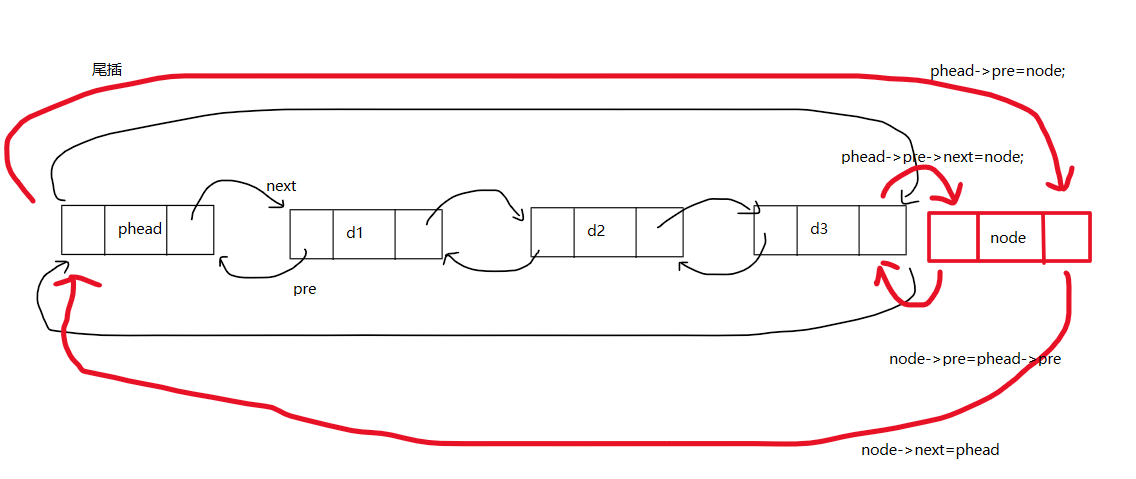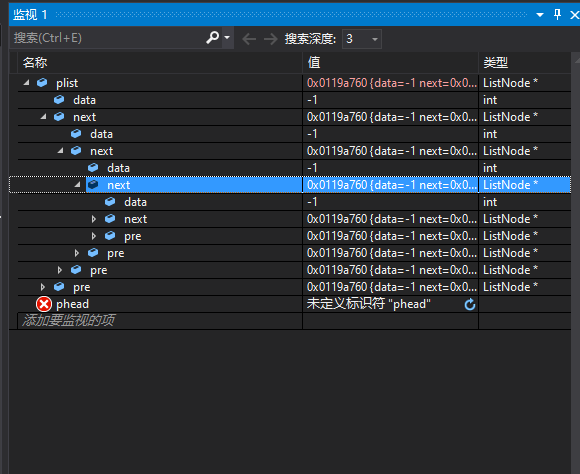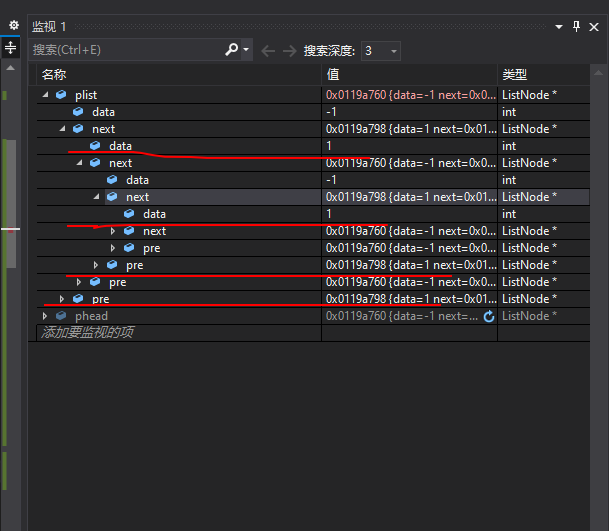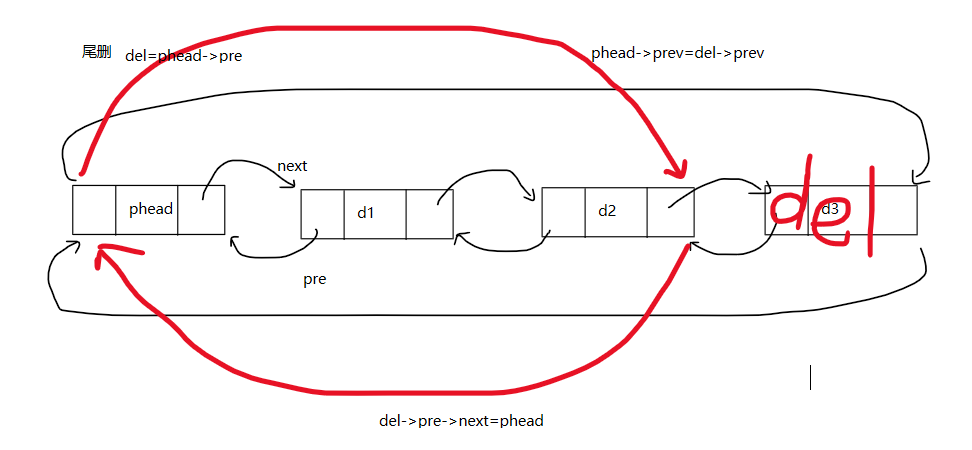C语言数据结构-双向链表
2023-12-13 17:34:50
文章目录
1 双向链表的结构

带头链表的头结点,实际是"哨兵位",哨兵位节点不存储任何有效元素,只是站在这里"放哨的".
哨兵位的意义:遍历循环链表避免死循环.
2 双向链表的实现
笔者在删除,插入数据时,画好图后,也好了代码,但是在调试中多次出现代码位置出错,导致写的代码的含义不符合预期.
所以说思路一定要清晰,多多检查调试
2.1 定义双向链表的数据结构
typedef int ListDataType;
typedef struct ListNode
{
ListDataType data; //整型数据
struct ListNode* next; //前驱指针
struct ListNode* pre; //后驱指针
}ListNode;
2.2 打印链表
链表的第一个数据是phead->next,哨兵位不存储数据
循环链表中,遍历一遍,碰到phead为止
void ListPrint(ListNode* phead)
{
ListNode* cur = phead->next; //头结点,哨兵位的下一位
while (cur != phead)//双向循环链表,循环到哨兵位为止
{
printf("%d-> ", cur->data);
cur = cur->next;
}
}
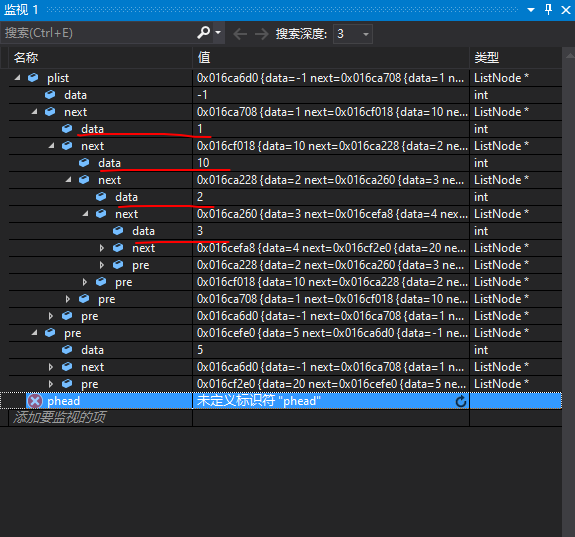
2.3 初始化链表
定义一个双向循环链表后,初始化链表,此时只有一个phead(哨兵位),前驱指针和后驱指针都指向phead自己
哨兵位的数据(data)在应用中不使用,就设置成-1了,与笔者之后使用的正整数形成差异
ListNode* ListInit()
{
ListNode* phead = (ListNode*)malloc(sizeof(ListNode));
if (phead == NULL)
{
perror("malloc error");
return;
}
phead->data = -1;
phead->next = phead->pre = phead;
return phead;
}
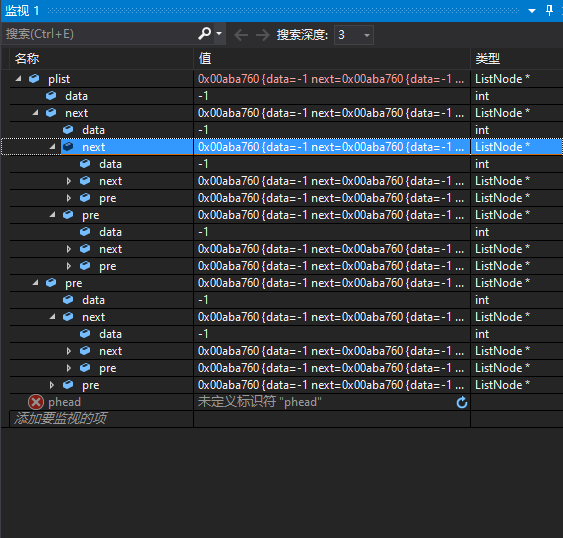
调试中发现,phead,phead->next,phead->pre地址相同,data都是笔者设置的-1.
2.4 销毁链表
遍历一遍链表进行销毁,cur碰到phead哨兵位为止
释放cur前,记录下cur->next,释放cur后,把cur->next赋值给cur,以此避免销毁cur后,cur->next不能指向下一个节点的情况
最后再把哨兵位释放,置空.
void ListDestory(ListNode* phead)
{
assert(phead);
ListNode* cur = phead->next; //头结点,哨兵位的下一位
while (cur!=phead)
{
//释放cur前,记录下cur->next,释放cur后,把cur->next赋值给cur
ListNode* NEXT = cur->next;
free(cur);
cur = NEXT;
}
//释放哨兵位
free(phead);
phead = NULL;
}
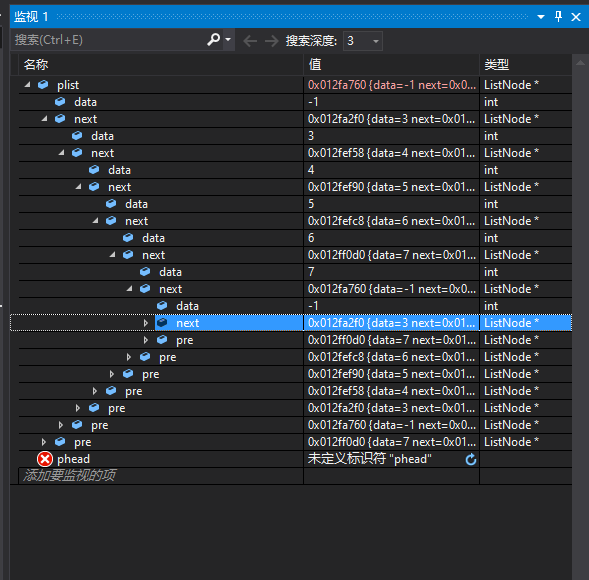
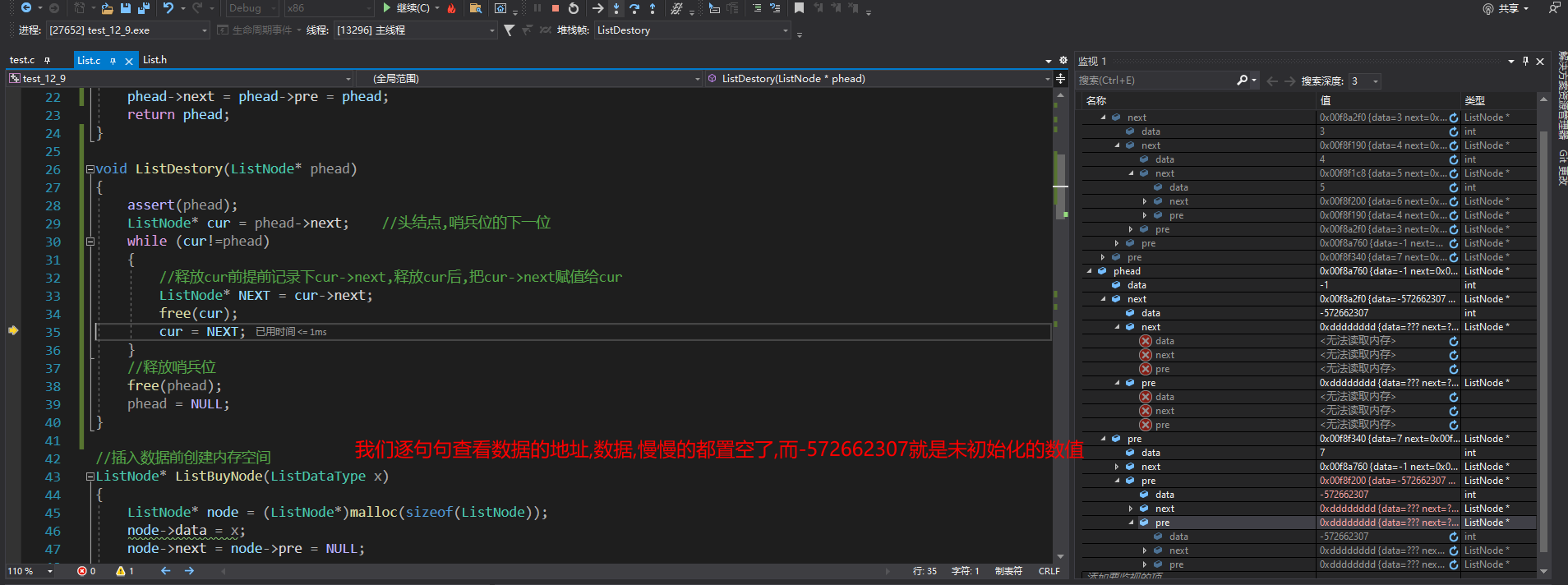
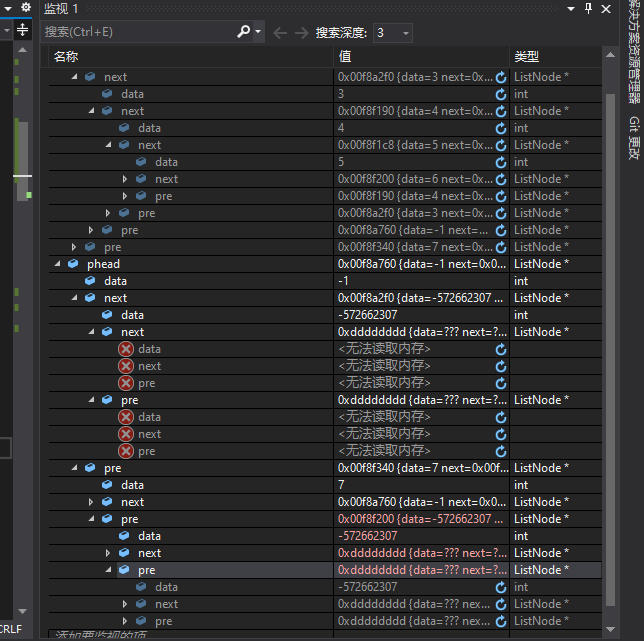
2.5 尾插,头插
先写一个创建内存空间的函数,创建node后,画图示意头插和尾插
一定注意编写代码的顺序,看看笔者注释所说的
//插入数据前创建内存空间
ListNode* ListBuyNode(ListDataType x)
{
ListNode* node = (ListNode*)malloc(sizeof(ListNode));
node->data = x;
node->next = node->pre = NULL;
return node;
}
void ListPushBack(ListNode* phead, ListDataType x)
{
assert(phead);
ListNode* node = ListBuyNode(x);
//先处理新节点前驱指针和后驱指针
node->pre = phead->pre;
node->next = phead;
//再处理原链表最后一个节点和phead
phead->pre->next = node;
phead->pre = node;
}
void ListPushFront(ListNode* phead, ListDataType x)
{
assert(phead);
ListNode* node = ListBuyNode(x);
//先处理新节点前驱指针和后驱指针
node->pre = phead;
node->next = phead->next;
//再处理phead和原链表第一个节点(phead->next)
phead->next->pre = node;
phead->next = node;
}
初始化成功,我们插入一个数据"1",成功插入
2.6 尾删,头删
删除链表至少有除哨兵位的一个数据,换句话说,链表不能只有一个哨兵位
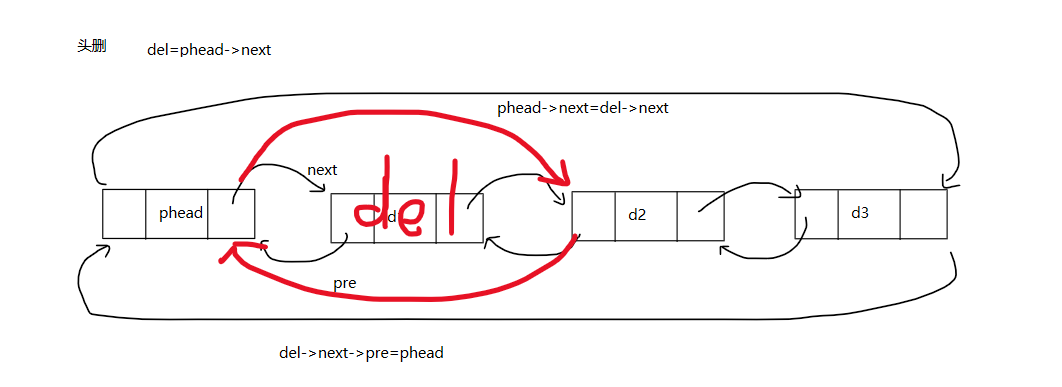
void ListPopBack(ListNode* phead)
{
assert(phead);
//链表不能只有一个哨兵位
assert(phead->next != phead);
ListNode* del = phead->pre;
//删除节点的前驱指针
del->pre->next = phead;
//phead的前驱指针
phead->pre = del->pre;
}
void ListPopFront(ListNode* phead)
{
assert(phead && phead->next != phead);
ListNode* del = phead->next;
del->next->pre = phead;
phead->next = del->next;
free(del);
del = NULL;
}
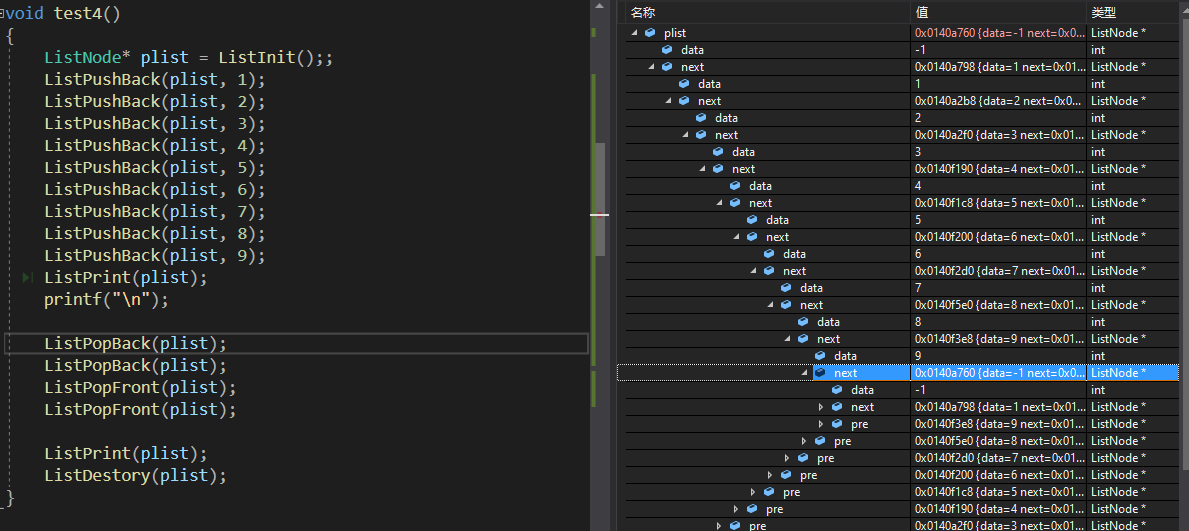
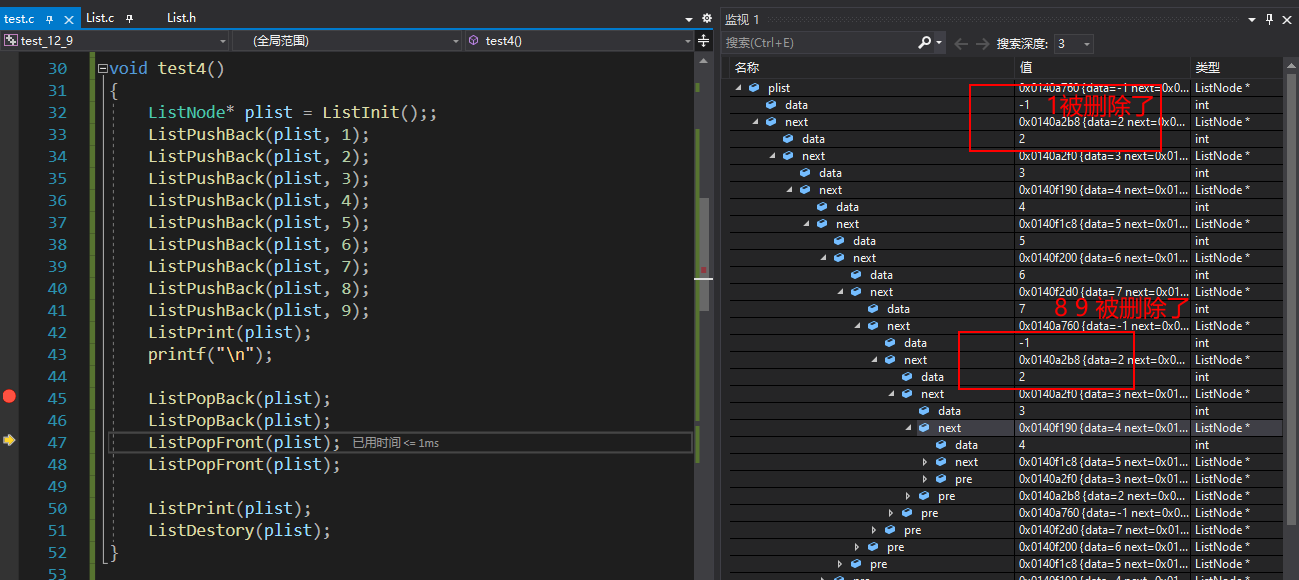
2.7 根据头次出现数据找下标
这个Find()函数在笔者的多篇博客都有提到缺点,但是我们主要实现功能,笔者在力扣题写过找多个相同元素,删多个相同元素的题
ListNode* ListFind(ListNode* phead, ListDataType x)
{
assert(phead);
ListNode* cur = phead->next;
while (cur != phead)
{
if (cur->data == x)
{
return cur;
}
cur = cur->next;
}
return NULL;
}
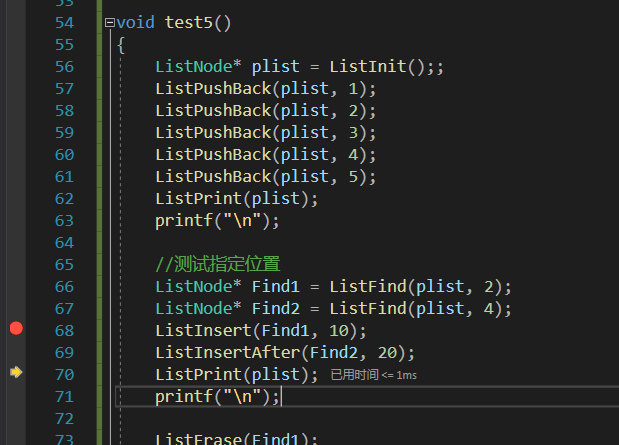
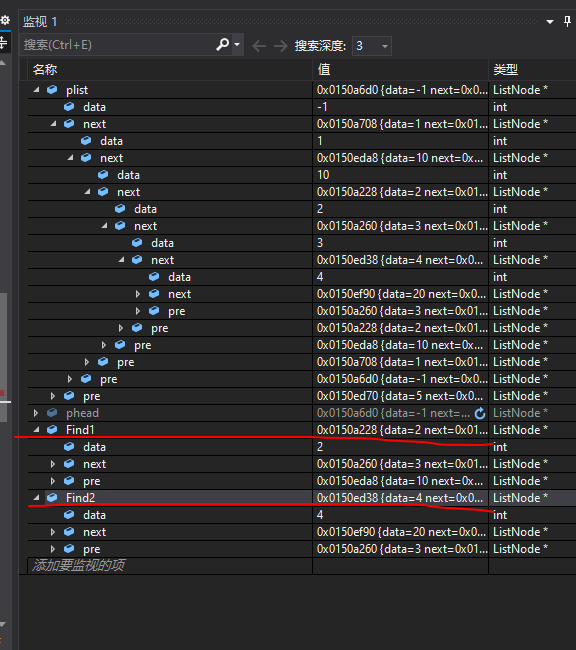
2.8 定点前插入
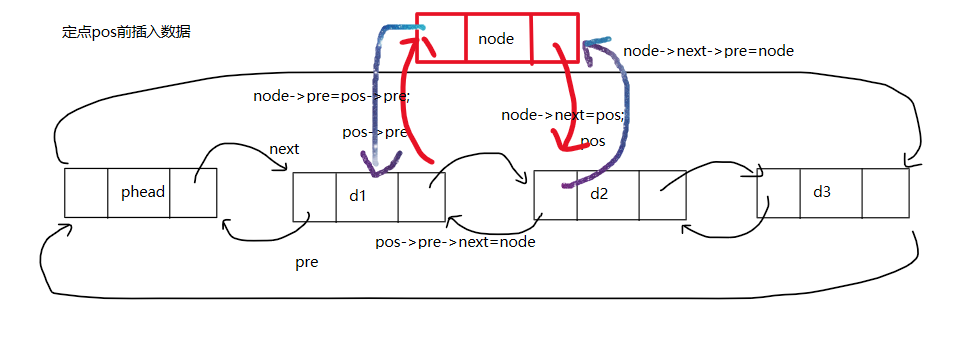
void ListInsert(ListNode* pos, ListDataType x)
{
assert(pos);
ListNode* node= ListBuyNode(x);
//先处理node
node->next = pos;
node->pre = pos->pre;
//在处理pos->pre和pos
pos->pre->next= node;
node->next->pre = node;
}

2.9 删除pos位置
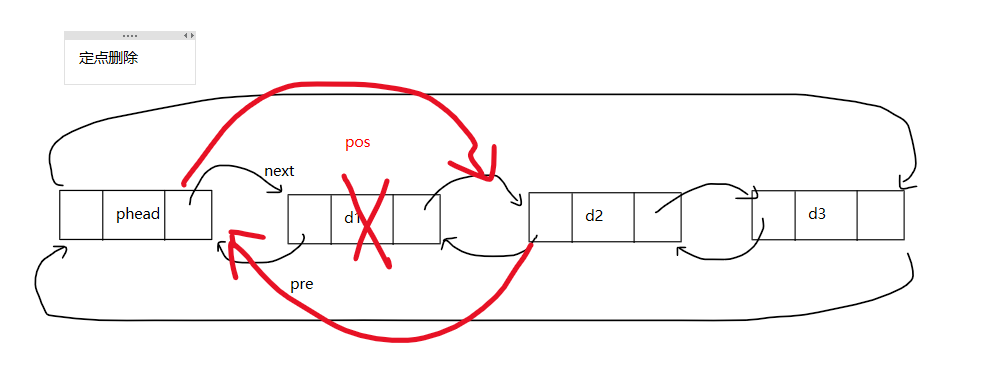
void ListErase(ListNode* pos)
{
assert(pos);
pos->next->pre = pos->pre;
pos->pre->next = pos->next;
free(pos);
pos = NULL;
}
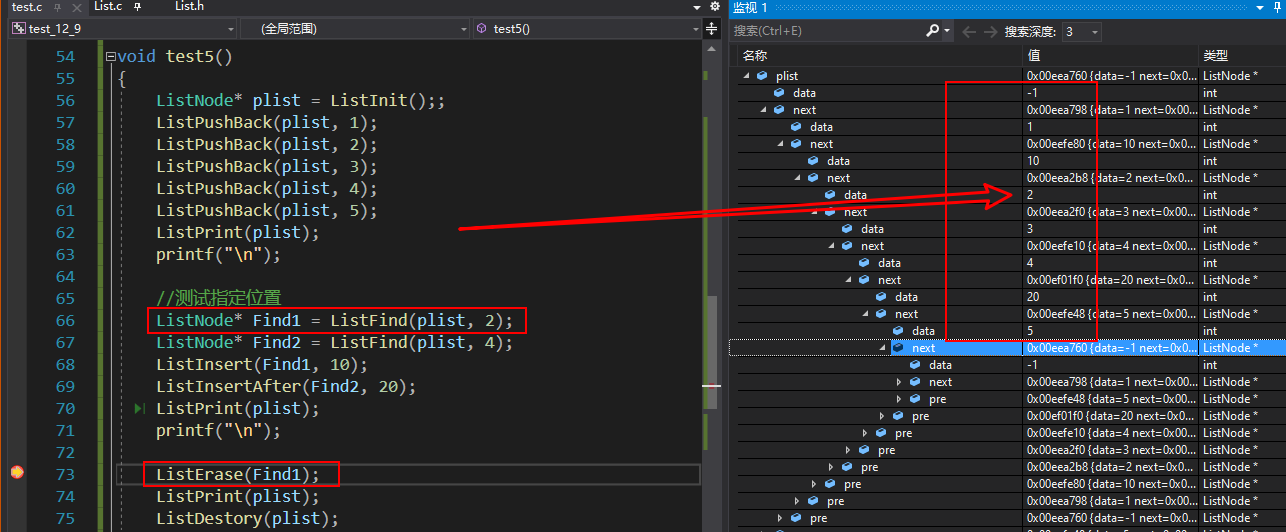
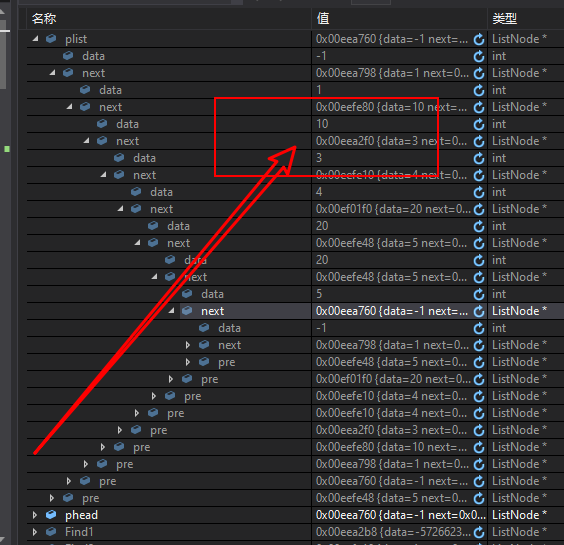
2.10 定点后插入
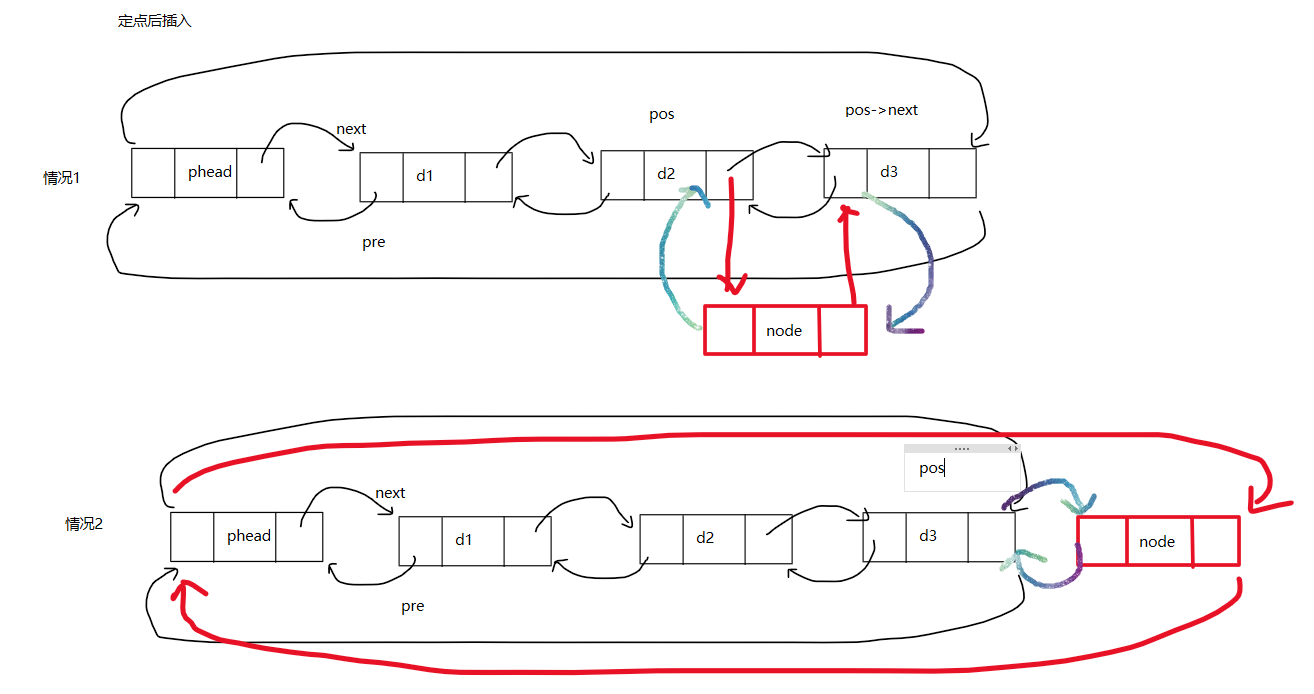
void ListInsertAfter(ListNode* pos, ListDataType x)
{
assert(pos);
ListNode* node = ListBuyNode(x);
//node的prev 和 next
node->next = pos->next;
node->pre = pos;
//pos的next 和 pos->next的prev
pos->next = node;
node->next->pre = node;
}

3 完整代码
3.1 List.h
#define _CRT_SECURE_NO_WARNINGS
#include<stdbool.h>
#include<stddef.h>
#include<stdio.h>
#include<stdlib.h>
#include<assert.h>
//0 定义双向循环链表节点结构
typedef int ListDataType;
typedef struct ListNode
{
ListDataType data;
struct ListNode* next; //前驱指针
struct ListNode* pre; //后驱指针
}ListNode;
//0 打印链表
void ListPrint(ListNode* phead);
//1 初始化链表
ListNode* ListInit();
//2 销毁链表
void ListDestory(ListNode* phead);
//3 尾插,头插
void ListPushBack(ListNode* phead, ListDataType x);
void ListPushFront(ListNode* phead, ListDataType x);
//4 尾删,头删
void ListPopBack(ListNode* phead);
void ListPopFront(ListNode* phead);
//5 根据数找到第一次出现的下标
ListNode* ListFind(ListNode* phead, ListDataType x);
//6 定点前插入
void ListInsert(ListNode* pos, ListDataType x);
//7 删除pos位置
void ListErase(ListNode* pos);
//8 定点后插入
void ListInsertAfter(ListNode* pos, ListDataType x);
3.2 Lish.c
#include "List.h"
void ListPrint(ListNode* phead)
{
ListNode* cur = phead->next;
while (cur != phead)//双向循环链表,循环到哨兵位为止
{
printf("%d-> ", cur->data);
cur = cur->next;
}
}
ListNode* ListInit()
{
ListNode* phead = (ListNode*)malloc(sizeof(ListNode));
if (phead == NULL)
{
perror("malloc error");
return;
}
phead->data = -1;
phead->next = phead->pre = phead;
return phead;
}
void ListDestory(ListNode* phead)
{
assert(phead);
ListNode* cur = phead->next; //头结点,哨兵位的下一位
while (cur!=phead)
{
//释放cur前提前记录下cur->next,释放cur后,把cur->next赋值给cur
ListNode* NEXT = cur->next;
free(cur);
cur = NEXT;
}
//释放哨兵位
free(phead);
phead = NULL;
}
//插入数据前创建内存空间
ListNode* ListBuyNode(ListDataType x)
{
ListNode* node = (ListNode*)malloc(sizeof(ListNode));
node->data = x;
node->next = node->pre = NULL;
return node;
}
void ListPushBack(ListNode* phead, ListDataType x)
{
assert(phead);
ListNode* node = ListBuyNode(x);
//先处理新节点前驱指针和后驱指针
node->pre = phead->pre;
node->next = phead;
//再处理原链表最后一个节点和phead
phead->pre->next = node;
phead->pre = node;
}
void ListPushFront(ListNode* phead, ListDataType x)
{
assert(phead);
ListNode* node = ListBuyNode(x);
//先处理新节点前驱指针和后驱指针
node->pre = phead;
node->next = phead->next;
//再处理phead和原链表第一个节点(phead->next)
phead->next->pre = node;
phead->next = node;
}
void ListPopBack(ListNode* phead)
{
assert(phead);
//链表不能只有一个哨兵位
assert(phead->next != phead);
ListNode* del = phead->pre;
//删除节点的前驱指针
del->pre->next = phead;
//phead的前驱指针
phead->pre = del->pre;
}
void ListPopFront(ListNode* phead)
{
assert(phead && phead->next != phead);
ListNode* del = phead->next;
del->next->pre = phead;
phead->next = del->next;
free(del);
del = NULL;
}
ListNode* ListFind(ListNode* phead, ListDataType x)
{
assert(phead);
ListNode* cur = phead->next;
while (cur != phead)
{
if (cur->data == x)
{
return cur;
}
cur = cur->next;
}
return NULL;
}
void ListInsert(ListNode* pos, ListDataType x)
{
assert(pos);
ListNode* node= ListBuyNode(x);
//先处理node
node->next = pos;
node->pre = pos->pre;
//在处理pos->pre和pos
pos->pre->next= node;
node->next->pre = node;
}
void ListErase(ListNode* pos)
{
assert(pos);
pos->next->pre = pos->pre;
pos->pre->next = pos->next;
free(pos);
pos = NULL;
}
void ListInsertAfter(ListNode* pos, ListDataType x)
{
assert(pos);
ListNode* node = ListBuyNode(x);
//node的prev 和 next
node->next = pos->next;
node->pre = pos;
//pos的next 和 pos->next的prev
pos->next = node;
node->next->pre = node;
}
3.3 test.c
#include"List.h"
void test1()
{
ListNode* plist = ListInit();
}
void test2()
{
ListNode* plist = ListInit();;
ListPushBack(plist, 1);
ListPushBack(plist, 4);
ListPushBack(plist, 7);
ListPrint(plist); //1->4->7->
ListDestory(plist);
}
void test3()
{
ListNode* plist = ListInit();;
ListPushFront(plist, 1);
ListPushFront(plist, 4);
ListPushFront(plist, 7);
ListPrint(plist);//7->4->1->
ListDestory(plist);
}
void test4()
{
ListNode* plist = ListInit();;
ListPushBack(plist, 1);
ListPushBack(plist, 2);
ListPushBack(plist, 3);
ListPushBack(plist, 4);
ListPushBack(plist, 5);
ListPushBack(plist, 6);
ListPushBack(plist, 7);
ListPushBack(plist, 8);
ListPushBack(plist, 9);
ListPrint(plist);
printf("\n");
ListPopBack(plist);
ListPopBack(plist);
ListPopFront(plist);
ListPopFront(plist);
ListPrint(plist);
ListDestory(plist);
}
void test5()
{
ListNode* plist = ListInit();;
ListPushBack(plist, 1);
ListPushBack(plist, 2);
ListPushBack(plist, 3);
ListPushBack(plist, 4);
ListPushBack(plist, 5);
ListPrint(plist);
printf("\n");
//测试指定位置
ListNode* Find1 = ListFind(plist, 2);
ListNode* Find2 = ListFind(plist, 4);
ListInsert(Find1, 10);
ListInsertAfter(Find2, 20);
ListPrint(plist);
printf("\n");
ListErase(Find1);
ListPrint(plist);
ListDestory(plist);
}
int main()
{
//test1();
//test2();
//test3();
//test4();
test5();
return 0;
}
笔者在删除,插入数据时,画好图后,也好了代码,但是在调试中多次出现代码位置出错,导致写的代码的含义不符合预期.
所以说思路一定要清晰,多多检查调试
文章来源:https://blog.csdn.net/m0_73678713/article/details/134907222
本文来自互联网用户投稿,该文观点仅代表作者本人,不代表本站立场。本站仅提供信息存储空间服务,不拥有所有权,不承担相关法律责任。 如若内容造成侵权/违法违规/事实不符,请联系我的编程经验分享网邮箱:veading@qq.com进行投诉反馈,一经查实,立即删除!
本文来自互联网用户投稿,该文观点仅代表作者本人,不代表本站立场。本站仅提供信息存储空间服务,不拥有所有权,不承担相关法律责任。 如若内容造成侵权/违法违规/事实不符,请联系我的编程经验分享网邮箱:veading@qq.com进行投诉反馈,一经查实,立即删除!
